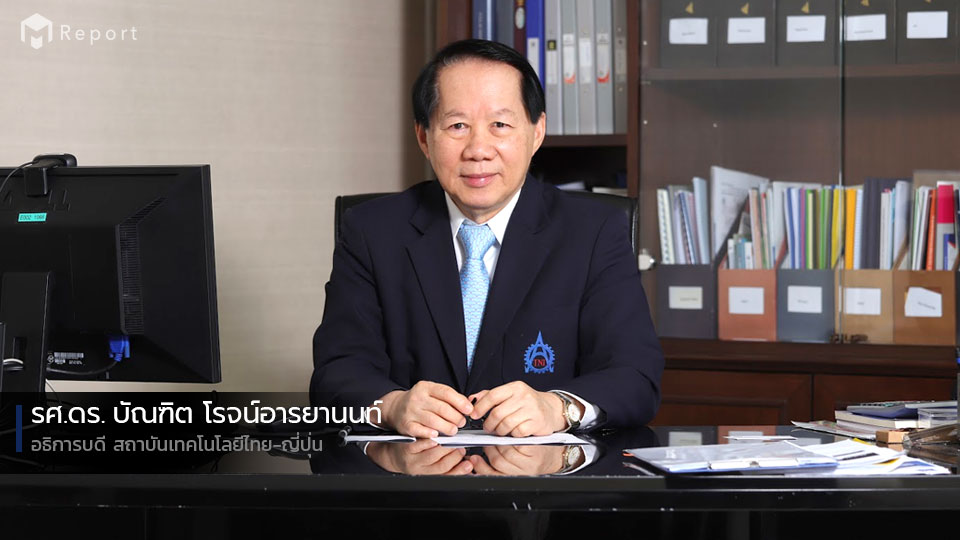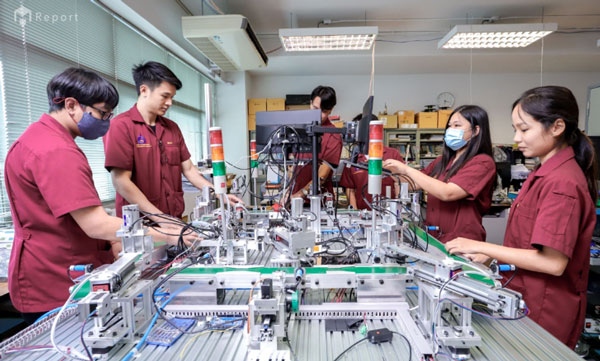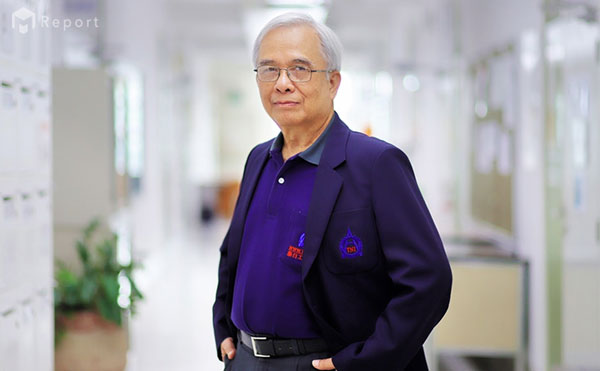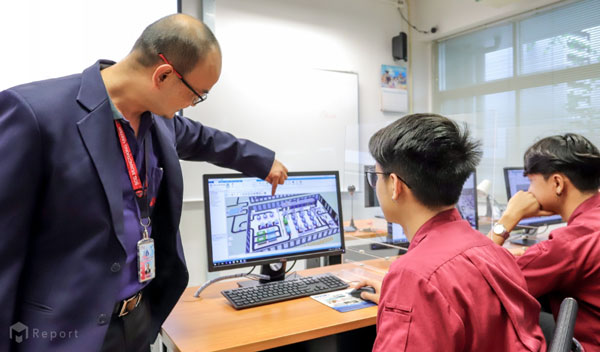
Thai-Nichi Institute of Technology (TNI) as Personnel Producer for the Industrial Businesses
An educational institution is the first base of developing "today's people" to be "personnel of tomorrow," people with knowledge and abilities in a wide variety of professions, which are essential resources for organizational, national, and international benefits.
Thai-Nichi Institute of Technology (TNI), a private higher education institution specializing in specific vocational technology, was founded by the Technology Promotion Association (Thailand-Japan). It offers bachelor and master degree programs focusing on engineering technology, information technology and business management to produce personnel for Thai industrial establishments since 2006. Assoc. Prof. Dr. Bundhit Rojarayanont, President, and Assoc. Prof. Dr. Choompol Antarasena, Dean of the Faculty of Engineering discussed with M Report on the challenges of the education sector in developing today’s people to be personnel of tomorrow.
What do you see as “Personnel of Tomorrow”?
When comparing a factory with an educational institution, we can see that their main mission shares a similarity, that is, a factory produces products while an educational institution produces personnel. Knowing the needs of the customer is necessary to determine the details of the production, which is a not too difficult step for a factory. However, for an educational institution, defining details in personnel production to meet the needs of the future is not as easy.
Assoc. Prof. Dr. Bundhit Rojarayanont commented that “Thailand currently has the production potential of the top 20 in the world and the second in ASEAN after Singapore. However, in the next 4-5 years, Thailand will begin to fall behind if there is no development. At this rate, Vietnam and Malaysia will be able to surpass Thailand within 10 years, coupled with the lack of personnel in the Thai labor market, especially personnel specializing in modern technology, as opposed to Vietnam with tens of thousands of students graduating each year, and China with hundreds of thousands. If Thailand wants to survive in the industry, it is inevitable that we should build new technology knowledge."
Since TNI was originally founded by Technology Promotion Association (TPA), which was derived from the cooperation and sacrifice of people who have studied and trained in Japan, and TNI’s activities have been receiving support from the Ministry of Economy, Trade and Industry (METI) of Japan to promote and pass on knowledge and new technology to Thai personnel, many investors and entrepreneurs of Thai and Japanese have been involved in TNI. This creates an exchange of information, industrial updates, current trends, and views from investors and business people. It is an important factor that puts TNI to always be on the same page as the industrialized business world, leading to appropriately getting all the resources ready and up for the changes for the production of personnel. This includes developing syllabus and training courses, procuring technology, machines, tools and equipment, selecting faculty members and recruiting experts to be guest speakers, and working with agencies and companies so that students have opportunities to do internships and work. Therefore, attending TNI institute distinctively means that students here: 1) will have language skills: Thai, English, and Japanese, 2) can join an ASEAN-Japan exchange program, 3) will learn the Japanese “Monozukuri” both in theory and practice, 4) can get a scholarship, 5) can do an internship or a practicum with leading Thai-Japanese companies, and 6) are guaranteed to have a job after graduation.
All of the above are driven by the core values that shape TNI students, who call themselves a "Thai-Japanese hybrid," to have 6 characteristics: 1. Monozukuri (thinker-and-doer), 2. Kaizen (continuous improvement), 3. Hansei (self-reflection), 4. Honest, 5. Respect, and 6. Public-Interest Conscious.

What Thailand Lacks
#1 Digital Technology It is undeniable that the advent of digital technology has created changes in every sector of society. The manufacturing sector also cannot avoid the emerging digital disruption. The digital technology is a factor that has a huge impact on modern manufacturing because it is an essential part of technology for a smart factory. It is no exaggeration to say that digital technology is the cornerstone of industrial development in the future.
Assoc. Prof. Dr. Bundhit Rojarayanont gave us a clear example about this that in many countries, there are unicorn businesses that can rise to the top of the world stage, developing various digital platforms that have emerged and are popular worldwide, whereasThailand still has no capability in this area.
#2 Modern Technology In the next 3-5 years, new technologies like automation will become part of the industry even more, enabling higher productivity in all sectors without exception. Those who do not adjust themselves can lose a great opportunity. Actually, it is difficult to keep all aspects of the same priorities, so we should focus on what is realistic, practical, and beneficial to the Thai society. One of the industries that we do well, have experiences and networks since we have been doing it for a long time, and have foreign support is the automotive industry, which has potential and can be further developed for Thailand.
Lack of expertise in modern technology is a weakness of the Thai industry, although Thailand is currently strong in the automotive industry. It is well known that our potential in this industry results from the investing in automotive manufacturing bases from many Japanese companies. Even though it has a total export value of more than 860 billion baht, which is the most value of Thai exports in 2019, the Thai automotive industry is on the verge of changes with the advent of electric cars.
#3 Effective Policy If Thailand still wants to be in the game, the shortage of personnel with expertise in modern technology essentially needs to be addressed. Producing experts takes time, and the syllabus adjustments may not show immediate results. In the past, the government has supported some up-skilling and reskilling projects, but they are put on hold due to the COVID-19. Of course, large businesses can develop their own personnel, but in SME businesses, the skill gaps will further increase if they get no support.
So, a spot-on and effective policy from the government will help promote the industry very well. Singapore is a good example of doing well and we should consider deploying a similar policy to use in Thailand. Singapore has imposed measures requiring all companies to give employees the right to attend training for one month a year since 20 years ago. In the past, Thailand had some policies to support human development, such as the Ministry of Labor's policy over the past 15 years, which required companies with more than a hundred employees to send their employees to training. There were also incentive programs, for example, the tax deduction in relation to the number of people sent to training, the assistance for engineering students, etc.
#4 Occupational Values Currently, TNI accepts an average of 1,000 students per year, but only about 800 students complete their study, or about 20-30% less than the starting number. There are 200 graduates each from engineering and information technology or IT, and 400 graduates from business administration. Most of the dropouts are engineering students because it is a difficult subject to study, so it requires determination, conviction and dedication. In addition, the number of engineering students is decreasing because of the decreasing occupational values nowadays. This problem is one of the factors that make the number of personnel in the industry even fewer.
Associate Professor Dr. Choompol Antarasena added, “The Faculty of Engineering was one of the most popular fields 20 years ago. However, children and parents nowadays do not understand what the Faculty of Engineering is about and what work they can do once they graduate. We have to try to enlighten them on how much needs in the industry due to the lack of engineers and how much earnings they could possibly earn in this career.”

Assoc. Prof. Dr. Choompol Antarasena, Dean of the Faculty of Engineering, TNI
To solve the problem of values, we need all hands on deck. We may take Japan as an example; Japan and Thai opened the country at about the same time, however, Japan has strived until becoming a leader in many industries and having a stable supply chain at present. It all comes from everyone trying to recreate values to develop technology and produce products of their own country, as opposed to Thailand where we focus on buying foreign technology and products.
Learn from “the Same Technology Used in Real Factories”
To be able to understand and practically apply technology, students should get to learn it through tools and equipment, along with hands-on training. Therefore, TNI chooses to invest in those with the same technology that is actually used in the factories despite their high prices. For example, we invest in 3D CAD software programs for automotive engineering courses, which is the program used by Toyota and Honda, so that students can use them from the first year. This puts the TNI graduates apart in that they can start work immediately as they have less learning curb and thus more chances of success in entering a career path after graduation.
TNI’s curriculum has been redefined, focusing on digital technology and modern technology. So, this year, TNI decided to invest in the Tecnomatix Plant Simulation software from Siemens, which is a digital production solution used to design the production line for maximum efficiency. We are supported with good technical support and service from ISID South East Asia (Thailand) Co., Ltd. which is a distributor and consultant on the product development process and provides systems engineering services focused on building and utilizing smart factory solutions.

Tecnomatix Plant Simulation software enables the simulation and optimization of production systems and processes. Plant Simulation helps create digital models of logistic systems (e.g., production) to explore the systems’ characteristics and to optimize their performance. The digital model enables users to run experiments and what-if scenarios without disturbing an existing production system or – when used in the planning process – long before the real system is installed. Extensive analysis tools, statistics and charts let users evaluate different manufacturing scenarios and make fast, reliable decisions in the early stages of production planning.
“Currently, the most popular courses of bachelor's degree programs offered at the Faculty of Engineering are in automotive engineering, computer engineering, electrical engineering, and industrial engineering. However, with the rapid growth of automation and digital technology, TNI has recently developed additional courses in lean robotics and automation and in digital engineering. TNI is the first institute in Thailand to offer these two programs that will suit the labor market in the next 5 years as the demand for digital technology personnel will increase significantly. As we can see, the institute is highly flexible and ready to continuously update the curriculum to keep up with the changes in the business world," Assoc. Prof. Dr. Choompol Antarasena concluded.

